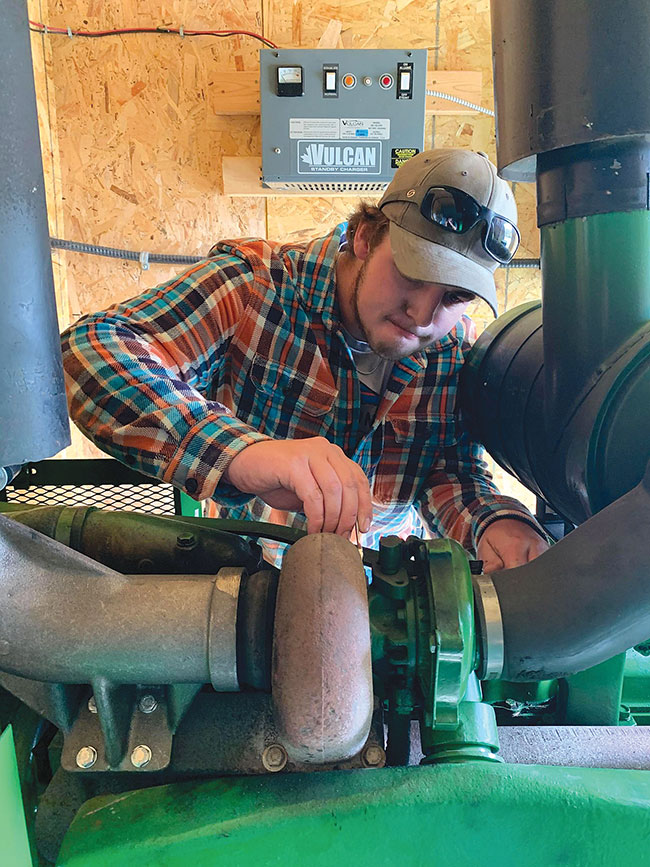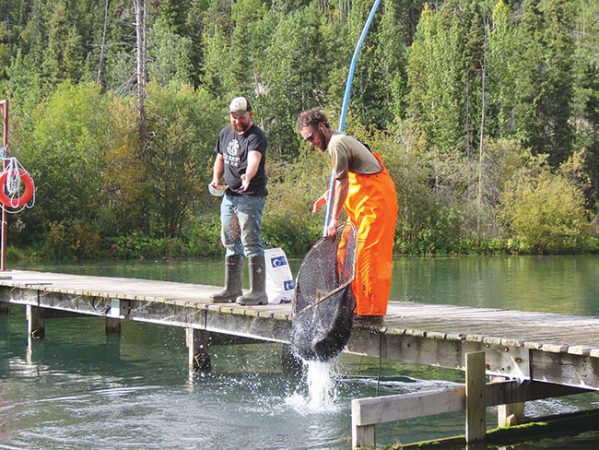
Features
Business Management
how-to
Keys to successful recruitment in a competitive hiring market
January 29, 2021 By Ron Hill
 Young workers can be particular about the company they decide to join. all Photos: Ron Hill
Young workers can be particular about the company they decide to join. all Photos: Ron Hill Successful companies understand they need to sell their company to prospective workers, particularly in a competitive market. The workforce and the minds of the people entering the aquaculture industry have changed drastically in the last 10 years. It is an insightful exercise to examine what these new breed of aquaculture workers are looking for and how they are weighing their life choices.
Compensation
Compensation is important to everyone but it is often only one priority for those entering the workforce. It’s important to have a competitive package. Low salary rates are likely to push students away, but higher salaries don’t necessarily attract them, either. Students may accept less money to work for a company that appeals to them, but only to a certain point. While employers may not be able to offer the highest salary in the industry, the whole employment offer package must be competitive.
Opportunity
Workers must be able to see progression and advancement in their career with the corresponding increases in compensation. Many of the larger companies have a structured “tech level” system of advancement to make sure that employees are compensated for advancing their role, responsibility and skills – even if they’re not moving to a management or specialized role. Smaller operations, where there aren’t many different roles and different pay rates, can have difficulty providing a path of advancement for their workers. While some students may not envision a role to grow into, others will see small operations as an opportunity to learn a larger skillset and gain experience on a wider range of jobs on the farm. Many students will consider entry level jobs at smaller operations because they feel they can learn a lot of transferable skills and make a big impact.
Impression
From when a company is first introduced to a student, the impression made on them can make or break the recruitment process. Perception is reality. Great presentations or site tours by knowledgeable and energetic individuals can entice students toward a company. To a student, how potential employees are treated during the recruitment process is a reflection of how they will be treated as an employee. Thus, if their emails and questions go unanswered or avoided, if they receive an offer verbally and receive a different offer in the written form, they will assume this is how the company operates and may cause them to take another offer.
People
The people who work for your company can be a huge draw for workers and are an often-overlooked resource for recruitment. Students want to talk with farmers. They want to see the quality of the people working with them and leading them. One of the reasons that Mitch Eisan (Manitoulin Trout Farms) chose his placement in 2020 was the quality of the people around him. “The Ontario industry is led by many astounding farmers which grow high-quality, local seafood. Being from Ontario, I saw it as a unique opportunity to begin contributing to the province’s seafood sector. I chose to pursue a placement in Ontario [to put] myself in a position where I can learn and continuously advance my knowledge towards aquaculture.” Highlighting former students and showing where they are now and how they have progressed are excellent recruitment strategies to help students envision a career path.
Environmental stewardship
Young people are extremely concerned by the state of the environment and will not tolerate a company that does not live up to their personal standard of responsibility. Students want to be part of the solution to the environment, food security and sustainability challenges. Third-party certifications like BAP or ASC are a good way to display corporate social responsibility, as are contributions/donations to local stewardship and restocking programs. Mayah Mahabeer chose her placement at Cermaq Canada because, “I loved the values of the company. They have such a close connection with indigenous people, they care so much about the environment and try their best to decrease their environmental footprint as much as possible. When I had my interview, I had the same vibe as my interviewers so I knew that I would work well with them.”

Employment security
Many students will generally not apply for positions that are seasonal, term-based or not permanent, unless they have a specific interest in that position. Government and funding-based jobs are notorious for offering an uncertain future. These jobs are usually well paying and interesting but the uncertainty of continuing will turn away all but the most passionate or those willing to chase term contract positions over a period of years.
Reputation
Despite the rosy pink smoke that some interviewers may blow to sell their company, students would typically have some idea of the company’s reputation before they sit down for the interview. Students may also reach out to former students to get an unofficial impression of a company from the inside.
Safety
Skills programs stress safety, protective equipment and making it home safe each day. Being able to make choices, students will avoid companies with low safety standards. In fact, many students will choose to have no job rather than work for a company with low safety standards.
Adventure
Often overlooked is the adventure and non-work experience associated with many aquaculture facility locations. Most people who get into aquaculture love the outdoors, hiking, fishing and can be enticed into remote locations when there is a lot of outdoor fun to be had. Students from inland regions are often interested in the adventure of living and working on the coast. If a facility is in a remote location, sell the remote location’s strengths and fabulous sights. Always mention fishing opportunities. Ryland Clarke, who took a co-op position at Icy Waters in the Yukon Territory, explains, “I chose this placement because it seemed like a great opportunity for me to grow in the aquaculture industry. I also liked the location. I love the outdoors and I had never been [to the Yukon] before, so I saw this as a good opportunity to experience the Yukon and all it has to offer. The fishing is also excellent.”
Selling it
Whatever the situation, make sure to send the best people to sell your farm/facility on the recruitment mission. The effort a company puts into recruitment is directly proportional to the quality and number of students they can attract. The labor market is very competitive and new workers are in a position to make choices and they know it.
Ron Hill is an aquaculture professional with 15 years of experience with production farms and RAS systems. For the last five years he was the lab coordinator and operations manager at Fleming College’s hatchery in Peterborough, Ontario. He is the owner and director of Velocity Aqua based in Ontario, Canada.
Print this page





